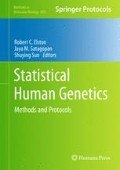Abstract
This chapter describes how the heritability of a trait can be estimated using data collected from pairs of twins. The principles of the classical twin design are described, followed by the assumptions and possible extensions of the design. In the second part of this chapter, two example scripts are presented and described, explaining the basic steps for estimating heritability using the statistical program OpenMx. OpenMx and the scripts used for this chapter can be downloaded so that readers can adapt and use the scripts for their own purposes.
Access this chapter
Tax calculation will be finalised at checkout
Purchases are for personal use only
Notes
- 1.
These authors contibuted equally (equal first authorship)
References
Holzinger KJ (1929) The relative effect of nature and nurture influences on twin differences. J Educ Psychol 20: 241–24.
Neale MC, Boker SM, Xie G et al (2006) Mx: Statistical Modeling, 7th edn. VCU Box 900126; Richmond, VA 23298, USA: Department of Psychiatry.
Kendler KS, et al (1993) A test of the equal-environment assumption in twin studies of psychiatric illness. Behav Genet 23: 21–2.
Keller MC, Coventry WL (2005) Quantifying and addressing parameter indeterminacy in the classical twin design. Twin Res Hum Genet 8: 201–21.
Mather K (1974) Non-allelic interaction in continuous variation of randomly breeding populations. Heredity 32: 414–41.
Boomsma DI, et al (1999) A religious upbringing reduces the influence of genetic factors on disinhibition: Evidence for interaction between genotype and environment on personality. Twin Res 2: 115–12.
Falconer DS (1989) Introduction to quantitative genetics, Longman Scientific and Technical, Harlow, Essex, UK
Keller MC, et al (2009) Modeling Extended Twin Family Data I: Description of the Cascade Model. Twin Res Hum Genet 12: 8–1.
Neale MC, Cardon LR (1992) Methodology for Genetic Studies of Twins and Families. Kluwer, Dordrecht, The Netherlands.
Author information
Authors and Affiliations
Corresponding author
Editor information
Editors and Affiliations
Rights and permissions
Copyright information
© 2012 Springer Science+Business Media, LLC
About this protocol
Cite this protocol
Verweij, K.J.H., Mosing, M.A., Zietsch, B.P., Medland, S.E. (2012). Estimating Heritability from Twin Studies. In: Elston, R., Satagopan, J., Sun, S. (eds) Statistical Human Genetics. Methods in Molecular Biology, vol 850. Humana Press. https://doi.org/10.1007/978-1-61779-555-8_9
Download citation
DOI: https://doi.org/10.1007/978-1-61779-555-8_9
Published:
Publisher Name: Humana Press
Print ISBN: 978-1-61779-554-1
Online ISBN: 978-1-61779-555-8
eBook Packages: Springer Protocols

